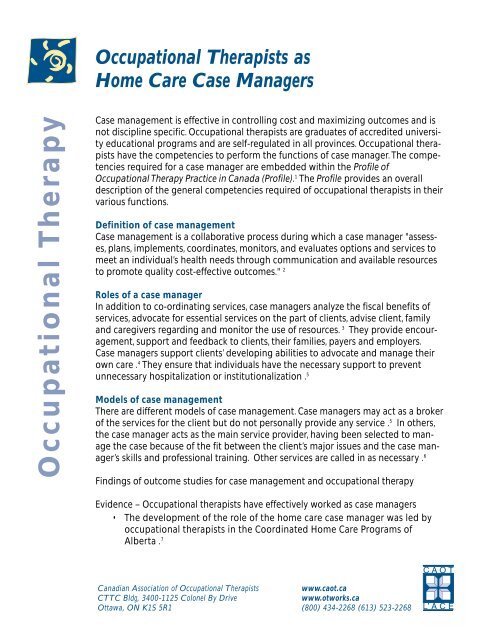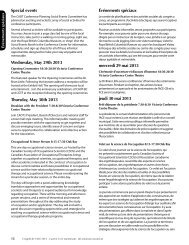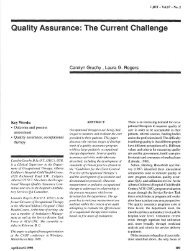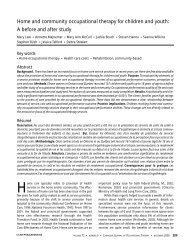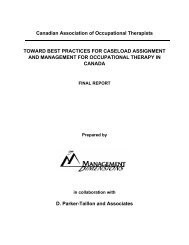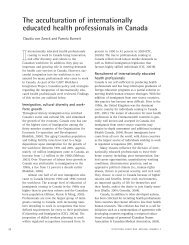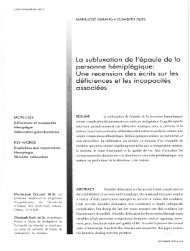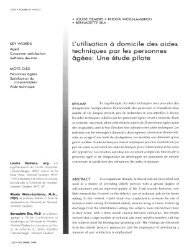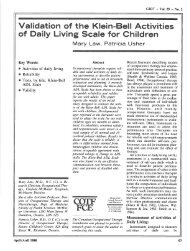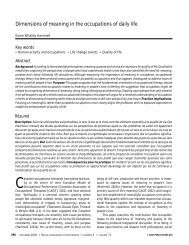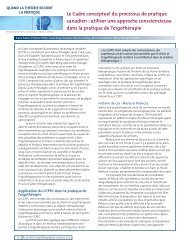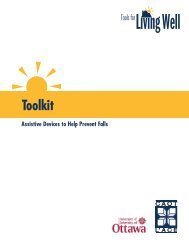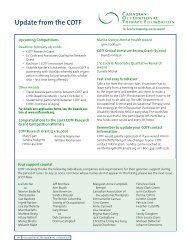Occupa tional T herap y - Canadian Association of Occupational ...
Occupa tional T herap y - Canadian Association of Occupational ...
Occupa tional T herap y - Canadian Association of Occupational ...
Create successful ePaper yourself
Turn your PDF publications into a flip-book with our unique Google optimized e-Paper software.
<strong>Occupa</strong><strong>tional</strong> T<strong>herap</strong>ists as<br />
Home Care Case Managers<br />
<strong>Occupa</strong><strong>tional</strong> T<strong>herap</strong>y<br />
Case management is effective in controlling cost and maximizing outcomes and is<br />
not discipline specific. <strong>Occupa</strong><strong>tional</strong> t<strong>herap</strong>ists are graduates <strong>of</strong> accredited university<br />
educa<strong>tional</strong> programs and are self-regulated in all provinces. <strong>Occupa</strong><strong>tional</strong> t<strong>herap</strong>ists<br />
have the competencies to perform the functions <strong>of</strong> case manager. The competencies<br />
required for a case manager are embedded within the Pr<strong>of</strong>ile <strong>of</strong><br />
<strong>Occupa</strong><strong>tional</strong> T<strong>herap</strong>y Practice in Canada (Pr<strong>of</strong>ile). 1 The Pr<strong>of</strong>ile provides an overall<br />
description <strong>of</strong> the general competencies required <strong>of</strong> occupa<strong>tional</strong> t<strong>herap</strong>ists in their<br />
various functions.<br />
Definition <strong>of</strong> case management<br />
Case management is a collaborative process during which a case manager "assesses,<br />
plans, implements, coordinates, monitors, and evaluates options and services to<br />
meet an individual’s health needs through communication and available resources<br />
to promote quality cost-effective outcomes." 2<br />
Roles <strong>of</strong> a case manager<br />
In addition to co-ordinating services, case managers analyze the fiscal benefits <strong>of</strong><br />
services, advocate for essential services on the part <strong>of</strong> clients, advise client, family<br />
and caregivers regarding and monitor the use <strong>of</strong> resources. 3 They provide encouragement,<br />
support and feedback to clients, their families, payers and employers.<br />
Case managers support clients’ developing abilities to advocate and manage their<br />
own care . 4 They ensure that individuals have the necessary support to prevent<br />
unnecessary hospitalization or institu<strong>tional</strong>ization . 5<br />
Models <strong>of</strong> case management<br />
There are different models <strong>of</strong> case management. Case managers may act as a broker<br />
<strong>of</strong> the services for the client but do not personally provide any service . 5 In others,<br />
the case manager acts as the main service provider, having been selected to manage<br />
the case because <strong>of</strong> the fit between the client’s major issues and the case manager’s<br />
skills and pr<strong>of</strong>essional training. Other services are called in as necessary . 6<br />
Findings <strong>of</strong> outcome studies for case management and occupa<strong>tional</strong> t<strong>herap</strong>y<br />
Evidence – <strong>Occupa</strong><strong>tional</strong> t<strong>herap</strong>ists have effectively worked as case managers<br />
• The development <strong>of</strong> the role <strong>of</strong> the home care case manager was led by<br />
occupa<strong>tional</strong> t<strong>herap</strong>ists in the Coordinated Home Care Programs <strong>of</strong><br />
Alberta . 7<br />
<strong>Canadian</strong> <strong>Association</strong> <strong>of</strong> <strong>Occupa</strong><strong>tional</strong> T<strong>herap</strong>ists<br />
www.caot.ca<br />
CTTC Bldg, 3400-1125 Colonel By Drive<br />
www.otworks.ca<br />
Ottawa, ON K1S 5R1 (800) 434-2268 (613) 523-2268
• An occupa<strong>tional</strong> t<strong>herap</strong>ist provides case management in the SIPA<br />
(Systèmes de services integers pour personnes âgées en perte d’autonomie)<br />
demonstration project. It concludes that occupa<strong>tional</strong> t<strong>herap</strong>ists<br />
have the necessary competencies to fill this role. 8<br />
• In the United Kingdom, occupa<strong>tional</strong> t<strong>herap</strong>ists provide case management<br />
for persons with a developmental disability on teams where health and<br />
social services are integrated. They also provide case management on<br />
community mental health and primary care teams for older adults . 5<br />
Evidence – <strong>Occupa</strong><strong>tional</strong> t<strong>herap</strong>y is a valuable discipline to provide case management.<br />
• <strong>Occupa</strong><strong>tional</strong> t<strong>herap</strong>y education ensures practitioners are able to provide<br />
a comprehensive assessment <strong>of</strong> skills, deficits, environmental demands<br />
and available resources. 3<br />
• <strong>Occupa</strong><strong>tional</strong> t<strong>herap</strong>ists’ appreciation <strong>of</strong> cognitive difficulties makes them<br />
particularly skilled in case management with individuals with a mental<br />
health disability as well as dementia-related problems. 3<br />
• <strong>Occupa</strong><strong>tional</strong> t<strong>herap</strong>ists can help to facilitate a continuum <strong>of</strong> care from<br />
the acute hospital setting to the community by emphasizing abilities to<br />
manage independently in the community. 9 They are particularly good at<br />
identifying system barriers to recovery. 10<br />
• Research has demonstrated that <strong>Canadian</strong> employers <strong>of</strong> occupa<strong>tional</strong><br />
t<strong>herap</strong>ists working in community mental health, value occupa<strong>tional</strong> t<strong>herap</strong>ists’<br />
holistic approach, and their client-centred, practical and outcome<br />
oriented focus. 10<br />
• Return to work is a growing area <strong>of</strong> managed care. <strong>Occupa</strong><strong>tional</strong> t<strong>herap</strong>ists<br />
provide excellent case management services to individuals with<br />
problems involving physical and/or mental health barriers to return to<br />
work. 4<br />
Evidence – Case management is an effective method <strong>of</strong> delivering care<br />
• In home care, intensification <strong>of</strong> case management activities for frail older<br />
clients results in decreased primary care physicians visits, emergency<br />
departments visits, hospital admissions, hospital length <strong>of</strong> stay, use <strong>of</strong><br />
Visit www.otworks.ca for further information about occupa<strong>tional</strong> t<strong>herap</strong>y. 2
hospital stay for awaiting placement and admission to residential care.<br />
10,11,12,13<br />
Case management is also associated with increased inpatient and<br />
caregiver satisfaction. 8<br />
Evidence – Case management is not limited to a specific discipline<br />
• Case management services may be provided by a variety <strong>of</strong> pr<strong>of</strong>essionals.<br />
3,4,14<br />
• Where case management certification bodies exist, a pr<strong>of</strong>essional degree<br />
or diploma in any area <strong>of</strong> health and human service is a minimal requirement.<br />
12,13<br />
• The Commission for Case Managers Certification requires the case manager<br />
candidate to have previous pr<strong>of</strong>essional certification or licence that<br />
allows the case manager to independently practise without the supervision<br />
<strong>of</strong> another health pr<strong>of</strong>essional. Furthermore, the case managers’ education<br />
must prepare them to perform six main functions <strong>of</strong> case management:<br />
assessment, planning, implementation, coordination, monitoring<br />
and evaluation. <strong>Occupa</strong><strong>tional</strong> t<strong>herap</strong>ists meet these criteria. 4<br />
Evidence – The required skill set determined by Ontario Case Managers’ <strong>Association</strong><br />
(OCMA) for a case manager is embedded in occupa<strong>tional</strong> t<strong>herap</strong>y education. This<br />
includes:<br />
- case management theory and principles,<br />
- community health perspectives,<br />
- communication technologies,<br />
- roles and parameters <strong>of</strong> other health and social science disciplines,<br />
- community and institu<strong>tional</strong> resources,<br />
- the aging process’<br />
- disease, disability,<br />
- working knowledge <strong>of</strong> clinical care and treatment options,<br />
- human behaviour and development,<br />
- thanatology,<br />
- family dynamics,<br />
- cultural norms and variances,<br />
- ethical and legal issues,<br />
- current legislation as it relates to service delivery in the community<br />
- program and policy development,<br />
- cost containment strategies,<br />
- quality management. 15<br />
Visit www.otworks.ca for further information about occupa<strong>tional</strong> t<strong>herap</strong>y. 3
These subject areas are covered in occupa<strong>tional</strong> t<strong>herap</strong>y university educa<strong>tional</strong> programs<br />
in Canada through academic and fieldwork education.<br />
In addition, case management requires effective communication skills, respect for<br />
diversity, conflict resolution and negotiating skills, crisis management skills, the ability<br />
to act as a life span coordinator (i.e. being able to project future care and responsibilities<br />
<strong>of</strong> the person who is ill or injured), critical thinking, leadership, resource<br />
management, and skills in educating, as well as autonomy, clinical skills, and organiza<strong>tional</strong><br />
ability. 4,9,14,15<br />
<strong>Occupa</strong><strong>tional</strong> t<strong>herap</strong>y education programs include and promote all these competencies.<br />
Getting to the root <strong>of</strong> the problem – An occupa<strong>tional</strong> t<strong>herap</strong>y case history<br />
<strong>Occupa</strong><strong>tional</strong> t<strong>herap</strong>ists who work as case managers can assist people to have a life<br />
that is more than simply living but is also meaningful.<br />
Mrs. Babinski was a 77-year-old widow who lived alone. She required oxygen due to<br />
emphysema. When she called her local community health centre to get help with<br />
bathing, she received a visit from occupa<strong>tional</strong> t<strong>herap</strong>ist Elaine McKee. Fortunately,<br />
Elaine was skilled not only in assisting individuals regain their func<strong>tional</strong> independence,<br />
she also proved to be an excellent case manager.<br />
Elaine quickly learned that Mrs. Babinski had worked many years as a pastry chef.<br />
Over the last several years she had become increasingly disabled. For three years<br />
she had been unable to leave the house, and could no longer get out to see her<br />
doctor. She believed that this decline was an inevitable part <strong>of</strong> living with emphysema.<br />
Elaine learned that Mrs. Babinski had become unable to cook for herself over the<br />
two months. However, she had enlisted the help <strong>of</strong> neighbours, by <strong>of</strong>fering to buy<br />
their groceries if they prepared the food and shared it with her.<br />
Elaine noted a strong smell <strong>of</strong> urine in the apartment. Apparently, Mrs. Babinski was<br />
unable to get to the bathroom in time and had started wearing incontinence pads.<br />
Due to increasing difficulty breathing, Mrs. Babinski was now sleeping in her recliner<br />
chair. She could not locate a family doctor who made house calls. She had been<br />
relying on a doctors’ visiting service to renew her prescriptions, but they were<br />
becoming reluctant to continue to do this for her.<br />
The occupa<strong>tional</strong> t<strong>herap</strong>ist quickly determined that what seemed like a simple, protracted<br />
problem, the inability to get in and out <strong>of</strong> the shower, was just one symp-<br />
Visit www.otworks.ca for further information about occupa<strong>tional</strong> t<strong>herap</strong>y. 4
tom <strong>of</strong> severe frailty brought on by untreated medical conditions. She returned<br />
within the week with a geriatrician. This physician diagnosed congestive heart failure<br />
and skin rashes. She was admitted to hospital and stabilized.<br />
Mrs. Babinski was able to get out to see her new family doctor, and resume many <strong>of</strong><br />
her previous activities, including cooking and showering after treatment for her<br />
congestive heart failure She was provided with a proper walker, portable oxygen<br />
tank and occupa<strong>tional</strong> t<strong>herap</strong>y intervention that included techniques to ensure that<br />
she conserved energy in her daily activities.<br />
Mrs. Babinski recalls the time before Elaine’s visit with difficulty. "It seemed as<br />
though I didn’t live on earth at all during that time," she stated. "I had just about<br />
reached rock bottom and as far as my health was concerned, you saved my life." 17<br />
This scenario demonstrates that occupa<strong>tional</strong> t<strong>herap</strong>ists possess the education,<br />
expertise and orientation to provide case management services to individuals <strong>of</strong> all<br />
ages with a mental or physical health problem.<br />
Visit www.otworks.ca for further information about occupa<strong>tional</strong> t<strong>herap</strong>y. 5
Reference List<br />
1. <strong>Canadian</strong> <strong>Association</strong> <strong>of</strong> <strong>Occupa</strong><strong>tional</strong> T<strong>herap</strong>ists. (2002). Pr<strong>of</strong>ile <strong>of</strong><br />
<strong>Occupa</strong><strong>tional</strong> T<strong>herap</strong>y Practice in Canada. Retrieved April 29, 2003. Web site:<br />
http://www.caot.ca/pdfs/otpr<strong>of</strong>ile.pdf<br />
2. Case Management Society <strong>of</strong> America.(1993)<br />
3. American <strong>Occupa</strong><strong>tional</strong> T<strong>herap</strong>y <strong>Association</strong>. (1991). Statement: the occupa<strong>tional</strong><br />
t<strong>herap</strong>ist as case manager. American Journal <strong>of</strong> <strong>Occupa</strong><strong>tional</strong><br />
T<strong>herap</strong>y, 45, 1065-1066.<br />
4. Fisher, T. (1996). Roles and functions <strong>of</strong> a case manager. American Journal <strong>of</strong><br />
<strong>Occupa</strong><strong>tional</strong> T<strong>herap</strong>y, 50, 452-454.<br />
5. Ovretveit, J. (1992). Concepts <strong>of</strong> case management. British Journal <strong>of</strong><br />
<strong>Occupa</strong><strong>tional</strong> T<strong>herap</strong>y, 55, 225-228.<br />
6. Russo, D. & Innes, E. (2002). An organiza<strong>tional</strong> case study <strong>of</strong> the case manager's<br />
role in a client's return-to-work programme in Australia.<br />
<strong>Occupa</strong><strong>tional</strong> T<strong>herap</strong>y Interna<strong>tional</strong>, 9, 57-75.<br />
7. <strong>Canadian</strong> <strong>Association</strong> <strong>of</strong> <strong>Occupa</strong><strong>tional</strong> T<strong>herap</strong>ists. (1990). Position paper on<br />
occupa<strong>tional</strong> t<strong>herap</strong>y in home care. <strong>Canadian</strong> Journal <strong>of</strong> <strong>Occupa</strong><strong>tional</strong><br />
T<strong>herap</strong>y, 57, suppl 1-8. Retrieved May 1, 2003 Web site:<br />
http://www.caot.ca/default.cfm?ChangeID=189&pageID=189<br />
8. Lebel, P. (2002). Les résultats de l'évaluation du projet de démonstratin SIPA:<br />
Qualité des soins et des services. Paper presented at the L'expérience SIPA:<br />
une pratique avancée, interdisciplinaire, ancrée dans la communauté,<br />
Montréal.<br />
9. Lohman, H. (1999). What will it take for more occupa<strong>tional</strong> t<strong>herap</strong>ists to<br />
become case managers? Implications for education, practice, and policy.<br />
American Journal <strong>of</strong> <strong>Occupa</strong><strong>tional</strong> T<strong>herap</strong>y, 53, 111-113.<br />
10. Baker, D.I., Gottschalk, M., Eng, C., Weber, S. & Tinetti, M.E. (2001). Practice<br />
Visit www.otworks.ca for further information about occupa<strong>tional</strong> t<strong>herap</strong>y. 6
concepts. The design and implementation <strong>of</strong> a restorative care model for<br />
home care. Gerontologist. 4, 257-63.<br />
11. Tryssenaar, J., Ball, J. & Klassen, K. (1997). Employers' perceptions <strong>of</strong> occupa<strong>tional</strong><br />
t<strong>herap</strong>y in community mental health. <strong>Occupa</strong><strong>tional</strong> T<strong>herap</strong>y in<br />
Mental Health, 13, 63-79.<br />
12. Boyd, M. L., Fisher, B., Davidson, A. W. & Neilsen, C. A. (1996). Communitybased<br />
case management for chronically ill older adults. Nursing<br />
Management, 27, 31-32.<br />
13. Newcomer, R., Arnsberger, P. & Zhang, X. (1997). Case management, client<br />
risk factors and service use. Health Care Financing Review, 19, 105-120<br />
14. Béland, F., Bergman, H. & Lebel, P. (2001). SIPA: Un Système de services intégrés<br />
pour personnes âgées en perte d'autonomie. - Évaluation de la phase I,<br />
juin 1999 à mai 2000. Montréal: Groupe de recherche Universités de<br />
Montréal et McGill sur les services intégrés aux personnes âgées.<br />
15. Carefoote, R. L. (1998). Health care issues: managing services and people<br />
in home care: today's challenge. <strong>Canadian</strong> Journal <strong>of</strong> Nursing<br />
Administration, 11, 77-94.<br />
16. Hilgendorf, P. M. (1996). Pr<strong>of</strong>ile <strong>of</strong> the successful home health nurse case<br />
manager. Nursing Management, 27(10), 32Q-32R, 32U-32V.<br />
17. McKee, E. (1997). Pastry chef returns to her kitchen. In <strong>Canadian</strong><br />
<strong>Occupa</strong><strong>tional</strong> T<strong>herap</strong>y Foundation (Eds.). Outcomes that matter in occupa<strong>tional</strong><br />
t<strong>herap</strong>y. Toronto, ON: <strong>Canadian</strong> <strong>Occupa</strong><strong>tional</strong> T<strong>herap</strong>y Foundation.<br />
Addi<strong>tional</strong> reading<br />
Krupa, T. & Clark, C.C. (1995). <strong>Occupa</strong><strong>tional</strong> t<strong>herap</strong>ists as case managers: Responding<br />
to current approaches to community mental health service delivery. <strong>Canadian</strong><br />
Journal <strong>of</strong> <strong>Occupa</strong><strong>tional</strong> T<strong>herap</strong>y, 62, 16-22.<br />
<strong>Canadian</strong> <strong>Association</strong> <strong>of</strong> <strong>Occupa</strong><strong>tional</strong> T<strong>herap</strong>ists. (1998) Academic Accreditation<br />
Standards and Self-study Guide. Ottawa: CAOT Publications ACE.<br />
Visit www.otworks.ca for further information about occupa<strong>tional</strong> t<strong>herap</strong>y.<br />
7


